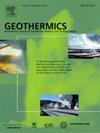日本大阪地热井氧化铁堵塞的自然恢复
IF 3.5
2区 工程技术
Q3 ENERGY & FUELS
引用次数: 0
摘要
根据对该系统中地下水和积水的地球化学分析,记录了位于日本大阪舞岛的 ATES(含水层热能储存)系统的堵塞原因和随后的独特恢复过程。在 ATES 地热井的冷却运行过程中,铁氧氢氧化物沉淀堵塞了滤网。对含水层和管道中的水进行化学分析后发现,溶解铁的氧化与环境空气的侵入有关,而环境空气是通过不慎打开的空气弯管阀泄漏到井中的。同一口井的两个含水层被封隔器隔开,安装了双汲取热量系统,其中一口热力井的浅层含水层的管道发生关闭。该含水层无法用作 ATES,直到堵塞发生约半年后,铁氧氢氧化物自然溶解。之后,ATES 系统才恢复正常。随着 NH4+ 的增加和氧化还原电位的降低,铁的溶解度也在增加,这表明铁氧氢氧化物是通过微生物诱导的还原反应溶解的。这一案例表明,有些堵塞可以在不进行化学和/或物理处理的情况下得到缓解,而监测地下水化学性质对于诊断和处理堵塞至关重要。本文章由计算机程序翻译,如有差异,请以英文原文为准。
Natural recovery from Fe-oxyhydroxide clogging of a geothermal well in Osaka, Japan
Causes of clogging and the following unique recovering process of an ATES (Aquifer Thermal Energy Storage) system in Maishima (Osaka, Japan) are documented based on the geochemical analyses of groundwater and stagnant water in the system. Fe-oxyhydroxides precipitation clogged screens in an ATES geothermal well during cooling operation. Chemical analyses of waters in the aquifers and plumbing pipes found out that oxidation of dissolved Fe occurred in association with intrusion of ambient air, which was leaked through inadvertently opened air bent valve, into the well. Dual heat-extraction system was installed in the two aquifers of the same wells separated by packers, and the closing occurred in the plumbing pipe installed in the shallow aquifer of one of the thermal wells. This aquifer could not be used as the ATES until when the Fe-oxyhydroxides were naturally dissolved in about a half year after the clogging. Then, the ATES system recovered to be useful. Increasing dissolved Fe with increasing NH4+ and decreasing oxidation–reduction potential indicated that the Fe-oxyhydroxides were dissolved by microbially induced reduction reactions. This case suggests that some clogs can be mitigated without chemical and/or physical treatment, and that monitoring of groundwater chemistry is essential for diagnosing and treating clogs.
求助全文
通过发布文献求助,成功后即可免费获取论文全文。
去求助
来源期刊

Geothermics
工程技术-地球科学综合
CiteScore
7.70
自引率
15.40%
发文量
237
审稿时长
4.5 months
期刊介绍:
Geothermics is an international journal devoted to the research and development of geothermal energy. The International Board of Editors of Geothermics, which comprises specialists in the various aspects of geothermal resources, exploration and development, guarantees the balanced, comprehensive view of scientific and technological developments in this promising energy field.
It promulgates the state of the art and science of geothermal energy, its exploration and exploitation through a regular exchange of information from all parts of the world. The journal publishes articles dealing with the theory, exploration techniques and all aspects of the utilization of geothermal resources. Geothermics serves as the scientific house, or exchange medium, through which the growing community of geothermal specialists can provide and receive information.
 求助内容:
求助内容: 应助结果提醒方式:
应助结果提醒方式:


